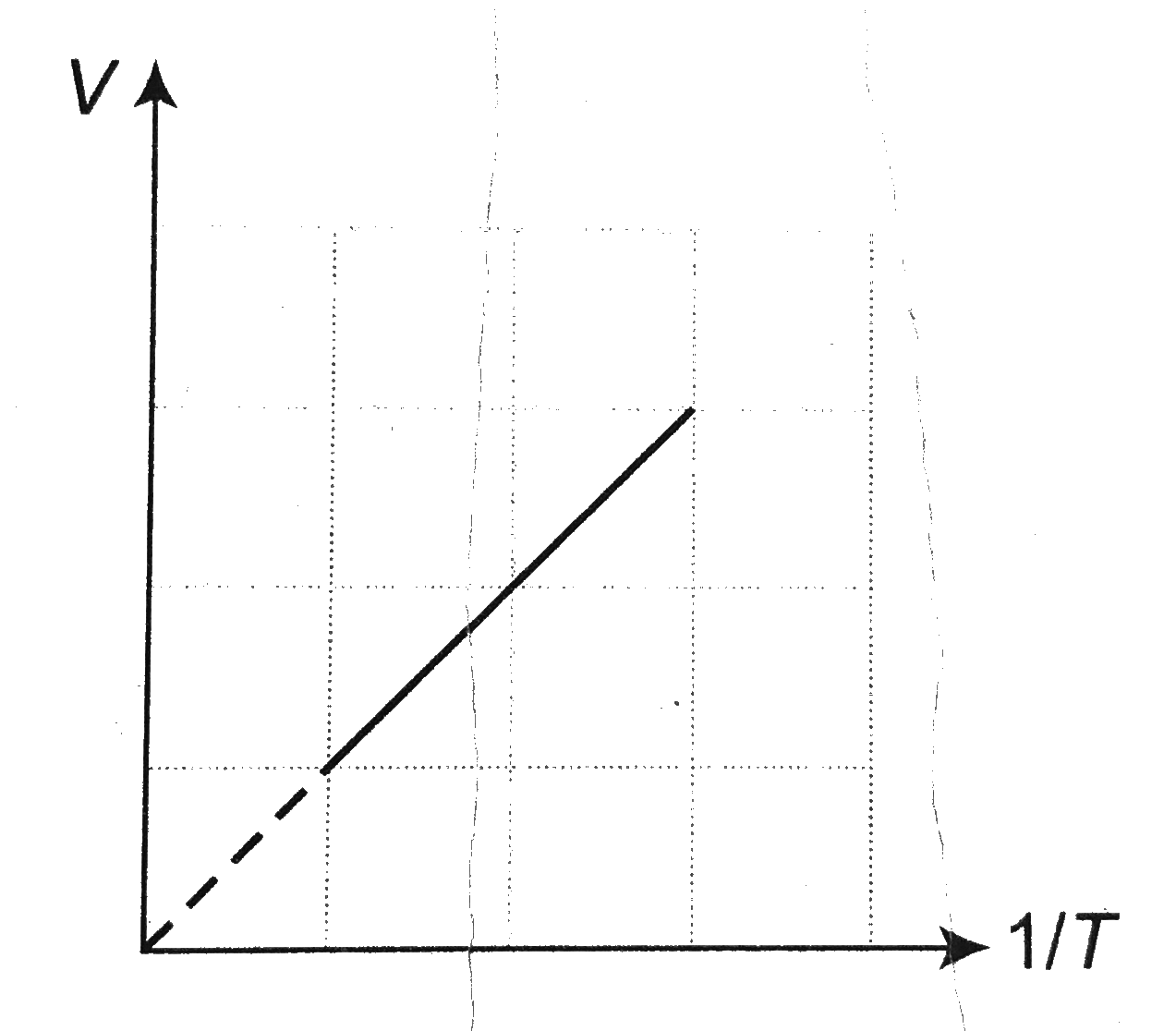One mole of an ideal monatomic gas undergoes a process described by the equation PV3= constant. The heat capacity of the gas during this process is
2R
R
32R
52R
The correct Answer is:B
To find the heat capacity of one mole of an ideal monatomic gas undergoing a process described by the equation PV3=constant, we can follow these steps:
Step 1: Identify the process and its characteristics
The given process is defined by the equation PV3=constant. This indicates that the gas is undergoing a polytropic process where the relationship between pressure (P) and volume (V) is not linear.
Step 2: Determine the value of X
In the context of heat capacities, we can express the heat capacity C during a process as:
C=Cv+R1−X
where Cv is the molar heat capacity at constant volume, R is the universal gas constant, and X is the exponent in the polytropic process equation. Here, X=3.
Step 3: Calculate Cv for a monatomic ideal gas
For a monatomic ideal gas, the degrees of freedom F is 3. Therefore, the molar heat capacity at constant volume Cv is given by:
Cv=F2R=32R
Step 4: Substitute values into the heat capacity equation
Now, substituting Cv and X into the heat capacity equation:
C=Cv+R1−X=32R+R1−3
C=32R+R−2
Step 5: Simplify the equation
Now, we simplify the equation:
C=32R−12R
C=3R−R2=2R2=R
Conclusion
Thus, the heat capacity C of the gas during this process is:
C=R
The given process is defined by the equation PV3=constant. This indicates that the gas is undergoing a polytropic process where the relationship between pressure (P) and volume (V) is not linear.
In the context of heat capacities, we can express the heat capacity C during a process as:
C=Cv+R1−X
where Cv is the molar heat capacity at constant volume, R is the universal gas constant, and X is the exponent in the polytropic process equation. Here, X=3.
For a monatomic ideal gas, the degrees of freedom F is 3. Therefore, the molar heat capacity at constant volume Cv is given by:
Cv=F2R=32R
Now, substituting Cv and X into the heat capacity equation:
C=Cv+R1−X=32R+R1−3
C=32R+R−2
Now, we simplify the equation:
C=32R−12R
C=3R−R2=2R2=R
Thus, the heat capacity C of the gas during this process is:
C=R
Topper's Solved these Questions
- KINETIC THEORY OF GASES AND THERMODYNAMICSBOOK - A2ZCHAPTER - KINETIC THEORY OF GASES AND THERMODYNAMICSEXERCISE - AIIMS Questions
27 Videos
- KINETIC THEORY OF GASES AND THERMODYNAMICSBOOK - A2ZCHAPTER - KINETIC THEORY OF GASES AND THERMODYNAMICSEXERCISE - Chapter Test
29 Videos
- KINETIC THEORY OF GASES AND THERMODYNAMICSBOOK - A2ZCHAPTER - KINETIC THEORY OF GASES AND THERMODYNAMICSEXERCISE - Assertion Reasoning
15 Videos
- GRAVITATIONBOOK - A2ZCHAPTER - GRAVITATIONEXERCISE - Chapter Test
29 Videos
- MOCK TESTBOOK - A2ZCHAPTER - MOCK TESTEXERCISE - Motion With Constant Acceleration
15 Videos
Similar Questions
H2 gas undergoes a process described by the equation PV5 = constant. The amount given of if 2 gas is one mole.The heat capacity of the gas during this process is k times the value of gas constant (R). Value of k is______.
View SolutionOne mole of an ideal monatomic gas undergoes the process P=αT1/2, where α is constant . If molar heat capacity of the gas is βR1 when R = gas constant then find the value of β.
View Solution
Knowledge Check
One mole of an ideal monoatomic gas undergoes a described by the equations PV3= constant The heat the gas during this process is :
A2RBRC32RD53ROne mole of a monoatomic ideal gas is expanded by a process described by PV3 = C where C is a constant. The heat capacity of the gas during the process is given by (R is the gas constant)
A2 RB52RC32RDROne mole of a monoatomic ideal gas undergoes a thermodynamic process such thatV3T2= constant. Then,
Awork done by the gas is 200R when temperature of the gas is raised by 300 KBthe specific heat of the gas in the process is 136RCwork done by the gas is 300R when temperature of the gas maised by 600 KDthe specific heat of the gas in the process is 214 R
An ideal gas with heat capacity at constant volume CV undergoes a quasistatic process described by PVα in a P-V diagram, where α is a constant. The heat capacity of the gas during this process is given by-
View SolutionAn ideal has undergoes a polytropic given by equation PVn = constant. If molar heat capacity of gas during this process is arithmetic mean of its molar heat capacity at constant pressure and constant volume then value of n is
View SolutionOne mole of an ideal monoatomic gas undergoes a process as shown in the figure. Find the molar specific heat of the gas in the process.

R is a gas constant.
View SolutionTwo moles of an ideal monoatomic gas undergoes a cyclic process ABCA as shown in V-T diagram below:

Heat supplied to the gas during the process AB is :
View SolutionAn ideal monatomic gas undergoes process PV1.25 = constant .Then
View Solution
